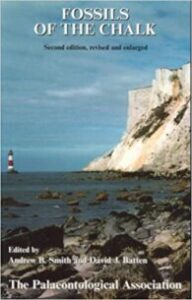Palaeontological Association Field Guide to Fossils No 2
Edited by Andrew B Smith and David J Batten

In recent years, there has been a lot written on the fossils of the UK Chalk. However, this guide was the first and is still probably the best for identifying and learning about the fossils that can be found in the chalk cliffs and pits of the UK. In fact, this is on the only PalAss guide to (usually) UK fossils for professionals and amateurs alike to go to a second edition.
As Fossils of the Chalk explains, the Chalk is one of the most characteristic stratigraphical units in Europe. It was deposited across much of northern Europe during the Upper Cretaceous, 100 to 65 million years ago.
I have found that some locations in the UK (for example, near Eastbourne) can be quite fossiliferous, but this is not always the case. However, chalk fossils are often beautifully preserved and relatively easy to prepare out of the matrix, using tools that are easily available to the amateur fossil collector. Therefore, the chalk continues to be a favourite formation for many fossil collectors. And this guide is still the best for identifying the diverse invertebrate and vertebrate fauna that can be collected.
After an introduction to the geology of the Upper Cretaceous of the UK, the guide covers almost 400 different species, illustrated in 59 black and white photographic plates. Each chapter, written by a different expert in their field, covers:
- Sponges.
- Corals.
- Serpulids.
- Brozoans.
- Brachiopods.
- Molluscs and bivalves.
- Gastropods.
- Ammonites.
- Nautiloids.
- Belemnites.
- Arthropods.
- Echinoderms.
- Fishes.
- Reptiles.
The book is aimed at the amateur collector. So, if you want a great guide to what you can collect from the chalk, this guide is definitely for you.
Fossils of the Chalk: Guide No 2 (2nd edition), edited by Andrew B Smith and David J Batten, The Palaeontological Association, London (2002), 374 pages (paperback), ISBN: 0901702781


